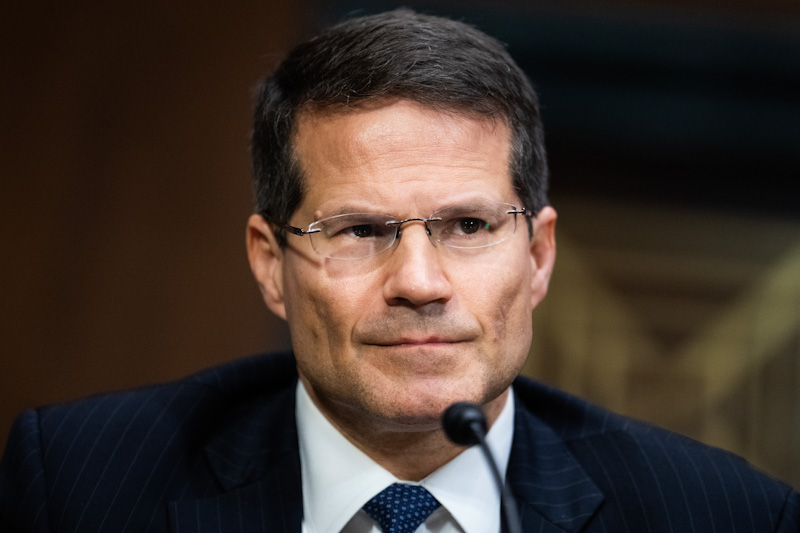What lawyers learned during the pandemic
6. When the global pandemic hit, couples in confinement had no choice but to face the hard truths of their relationships head-on. Our online collaborative divorce platform, Wevorce, saw a massive spike in traffic with over a million visits during lockdown. Our commitment to listening with empathy led to stark findings that changed our platform and our practice for good. On a 7-to-1 basis, even in the face of abuse, addiction and mental health issues, people were looking for respect above all. That’s why we joined forces with Kim Wright and Linda Alvarez to scale Conscious Contracts for clear and open family dispute resolution. We also introduced Private Judges, experienced facilitators and arbitrators who could mediate and issue legally binding verdicts online. —Michelle Crosby, founder of Wevorce, Boise, Idaho
7. The shift to a more remote-friendly meeting culture—particularly after AffiniPay, the parent company of LawPay, acquired our company during the pandemic—has enhanced interaction and engagement among our now-geographically dispersed workforce. As a result of the acquisition, I’m no longer an outlier in virtual meetings, which has significantly improved the quality of discussions. —Nicole Black, senior director of subject matter expertise and external education at MyCase and LawPay, Rochester, New York
8. The pandemic also highlighted the importance of robust business continuity and disaster recovery plans. Firms learned the value of preparing for disruptions and implementing contingency measures to ensure continuity of operations and client service. —Cynthia Thomas
9. Back in February 2020, I sent everyone who had been working at the Palace Law offices to work from home. I assumed it would be temporary and that everyone would return. A year later, nothing had changed, and productivity was decreasing. We also still had sick leave and a vacation policy, but it was nearly impossible to know who was working and wasn’t. Nobody reported time off. It was obvious that we needed to find a way to maintain productivity and accountability, or the firm would fail. So we took an existing concept of collecting and watching [key performance indicators] and customized individual “scorecards” for everyone working from home. Everyone had weekly, quarterly and annual goals. Everyone received a private weekly scorecard so they could follow their progress to achieve their goals. Further, we implemented an unlimited paid time off policy. We allowed employees to work as they wished without sick leave or vacation. Leave no longer seemed relevant or necessary. Together, these policies allowed significant employee autonomy and gave employees clear, measurable and achievable goals that had to be met. For those that achieved their goals and learned to be very productive from home—bonuses. Those that could not meet their goals were let go. Fast-forward to 2024, and everyone is still working from home, the firm has grown enormously, and productivity is higher than it has ever been. Thanks, COVID! —Patrick Palace
10. Perhaps the most valuable lesson I learned during the pandemic was the importance of maintaining a virtual practice. My firm has been paperless since 2013, and I have been an active user of Zoom since then as well. In fact, in February 2014, Kiesel Law was Zoom’s customer of the month! The pandemic brought to life, in real and scary terms, the critical need to be able to work virtually and seamlessly. I have often referred to this as the silver lining of the pandemic. —Paul Kiesel, partner at Kiesel Law, Beverly Hills, California
11. I learned that I need access to excellent internet to efficiently and effectively practice law. I work hybrid and have two internet providers in the event one goes down. This investment has proven to be crucial when the quality of internet connection has either been spotty or nonexistent. I learned that having access to a hot spot has been crucial as well to facilitate working from any location. This way, if the internet is spotty, there is always your cellphone! —Laura Farber, partner at Hahn & Hahn, Pasadena, California
12. Before the pandemic, I never would have dreamed of conducting divorce mediation remotely. However, 99% of clients love it. For some, it’s about the comfort of not being forced to sit in the same room as their future ex-spouse. For all, and for me, eliminating the commute to an office frees up a tremendous amount of time, which everyone appreciates. Remote mediation has been so successful that I have stopped offering in-person mediation. This has reduced my overhead, which allows me to keep my fees reasonable—a win-win for everyone. —Jennifer Kouzi, Kouzi Mediation, Consulting & Coaching, Hastings-on-Hudson, New York
13. You don’t have to be everywhere in person every time. While we all have Zoom fatigue now, before the pandemic, many of us were plane, train and automobile fatigued. Save the in-person meetings for when it truly matters. Virtual meetings often save time, reduce stress and get the job done just as well. —Mike Sims, president and chief growth officer of BARBRI Global, Dallas
14. One thing I’ve learned from the pandemic is how to better leverage technology in depositions. While we used to travel from coast to coast both defending and taking depositions, the vast majority now take place on Zoom, saving me and my client tremendous amounts of money. This shift has made it easier to execute depositions and keep cases moving forward. —Lloyd Bell, founding partner of Bell Law Firm, Atlanta
15. Even before the pandemic, we operated from several branches. However, the more widespread use of Zoom reaffirmed our dispersed model. It helped our team get comfortable using videoconferencing as a means of connecting and collaborating. In that way, the pandemic was a real boon to how we operate. —Matthew Neill Davis, CEO of Davis Business Law, Enid, Oklahoma






